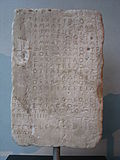The pluperfect (shortening of plusquamperfect), usually called past perfect in English, is a type of verb form, generally treated as a grammatical tense... 25 KB (3,029 words) - 00:13, 11 March 2024 |
Narcissistic number (redirect from Pluperfect Digital Invariant) In number theory, a narcissistic number (also known as a pluperfect digital invariant (PPDI), an Armstrong number (after Michael F. Armstrong) or a plus... 18 KB (1,998 words) - 22:49, 26 February 2024 |
Latin tenses (section Pluperfect indicative) as perfectum tenses), consisting of the perfect, future perfect, and pluperfect. To these six main tenses can be added various periphrastic or compound... 206 KB (27,200 words) - 09:30, 8 April 2024 |
forms for tenses, aspects, and/or moods—present, preterite, imperfect, pluperfect, future, and conditional. Three (or four) moods—indicative, subjunctive... 44 KB (1,400 words) - 13:14, 10 August 2023 |
 | Multiply perfect number (redirect from Pluperfect number) mathematics, a multiply perfect number (also called multiperfect number or pluperfect number) is a generalization of a perfect number. For a given natural number... 16 KB (1,706 words) - 01:39, 16 April 2024 |
 | four verb conjugations, six tenses (present, imperfect, future, perfect, pluperfect, and future perfect), three persons, three moods, two voices (passive... 104 KB (11,429 words) - 13:45, 1 May 2024 |
Persian verbs (section Pluperfect) imperfect, and pluperfect) is matched by a corresponding series of perfect tenses (perfect simple, perfect continuous, and perfect pluperfect — the last of... 50 KB (5,973 words) - 12:46, 12 March 2024 |
 | aorist, imperfect, and pluperfect, but not to any of the other forms of the aorist (no other forms of the imperfect and pluperfect exist). The two kinds... 48 KB (5,161 words) - 07:21, 14 April 2024 |
Subjunctive mood (redirect from Pluperfect subjunctive tense) derives from the pluperfect subjunctive of Vulgar Latin and the -ra from the pluperfect indicative, combining to overtake the previous pluperfect subjunctive... 87 KB (9,795 words) - 08:56, 1 May 2024 |
Ancient Greek verbs (section Pluperfect tense) imperfect, future, aorist (the equivalent of past simple), perfect, pluperfect, and future perfect. (The last two, especially the future perfect, are... 85 KB (8,745 words) - 22:36, 10 April 2024 |
 | preterite) and four tenses constructed with auxiliary verbs (perfect, pluperfect, future and future perfect). The distinction between grammatical aspects... 140 KB (13,996 words) - 19:34, 3 May 2024 |
 | Uses of English verb forms (redirect from Pluperfect progressive) progressive or past perfect continuous (also known as the pluperfect progressive or pluperfect continuous) combines perfect progressive aspect with past... 100 KB (14,000 words) - 11:37, 22 April 2024 |
interchangeable with amase, amases, amase, etc. Nevertheless, a few rare uses as a pluperfect subsist. Fell into disuse in modern Portuguese, now found only in literary... 34 KB (2,019 words) - 16:37, 2 May 2024 |
to ache, we can't bear it' In a past context, this becomes sī with the pluperfect indicative: sī quandō nostrī ferreīs manibus iniectīs nāvem religāverant... 67 KB (9,204 words) - 20:30, 10 November 2023 |
specified time in the past, and therefore has similar function to the pluperfect found in some languages. The past perfect progressive (sometimes referred... 20 KB (2,781 words) - 00:16, 17 April 2024 |
Matthew Reed, and Jann Wenner. The film was produced by Delphi III and Pluperfect and was released on June 7, 1985. It grossed $4.2 million during its opening... 13 KB (1,544 words) - 20:01, 30 April 2024 |
and "did something" (the preterite use). Other related forms are the pluperfect, denoting an event prior to a past time of reference, and the future perfect... 24 KB (3,361 words) - 15:33, 29 July 2023 |
 | Gilaki language (section Pluperfect) negative): The imperfect is formed with what was originally a suffix -i: The pluperfect is paraphrastically formed with the verb bon, "to be", and the past participle... 32 KB (1,883 words) - 06:33, 28 March 2024 |
averterint! (Cicero) 'but may the gods avert this omen!' The imperfect and pluperfect subjunctive are used in wishes to represent an imagined or wished for... 50 KB (5,825 words) - 19:41, 14 January 2024 |
seldom used pluperfect subjunctive and the pluperfect indicative, which is used in this situation. For example, Si on l'avait su (pluperfect indicative)... 30 KB (3,502 words) - 22:47, 10 August 2023 |
sim). 3. The imperfect, perfect, pluperfect and future perfect indicative are turned into the perfect or pluperfect subjunctive after primary and secondary... 30 KB (4,088 words) - 20:46, 2 October 2023 |
conditional", derived from the Latin pluperfect indicative tense. The second conditional is cognate with the literary pluperfect in Portuguese, the -ra imperfect... 13 KB (1,050 words) - 02:31, 20 February 2024 |
 | Aromanian language (section Pluperfect) conjugations, including: A present tense, a preterite, an imperfect, a pluperfect and a future tense in the indicative mood, for statements of fact. An... 49 KB (3,874 words) - 23:03, 24 April 2024 |
 | verbs are conjugated in four past forms—perfect, aorist, imperfect, and pluperfect—of which the last two have a very limited use (imperfect is still used... 49 KB (4,509 words) - 02:00, 9 April 2024 |
Korean verbs (section Pluperfect) weather forecasts. But it may be used together with the perfective and pluperfect suffixes, or in a present tense context. If used with the perfective suffix... 30 KB (3,235 words) - 03:49, 21 March 2024 |
Persian grammar (section Pluperfect) spoken form, ast is omitted, making خورده xorde 's/he has eaten". The pluperfect tense is formed by taking the stem of the perfect, e.g. خورده xorde, adding... 28 KB (3,404 words) - 18:20, 4 March 2024 |
more, if you were in Rome" "past contrary-to-fact" [if pluperfect subjunctive then pluperfect subjunctive] sī Rōmae fuissem, tē vīdissem "if I had been... 18 KB (2,117 words) - 16:09, 25 January 2024 |



